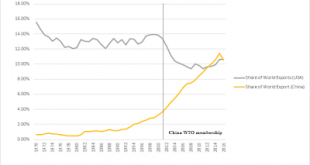With respect to to this post, readers might be interested in a long set of follow-up debates below. h/t Patrick Bond, whose contribution was just published here at Human Geography. David Harvey Denies Imperialism In a major critique of David Harvey’s work, the radical political economist John Smith takes on Harvey’s claim that the “East” is now exploiting the “West,” a statement, he argues, that is backed up by nothing more than his authority. Harvey could not be more wrong, or about a...
Read More »Jayati Ghosh — The Real Problem with Free Trade
Even if free trade is ultimately broadly beneficial, the fact remains that as trade has become freer, inequality has worsened. One major reason for this is that current global trade rules have enabled a few large firms to capture an ever-larger share of value-added, at a massive cost to economies, workers, and the environment.... The only significant exception to these trends is China, which has designed industrial policies specifically to increase the share of domestic value-added and to...
Read More »Frank Sellers — SHOCKER: US sides with Moscow over Kiev in WTO case
Typically, Washington is against anything that benefits Moscow, and is for anything which bolsters the position of US puppet regime Ukraine. But, at ongoing cases before the World Trade Organization, that narrative isn’t applicable. This is so because if Washington slam Moscow for its actions relative to Kiev, it would provide a case against Trump’s metals tariffs. However, by standing with Russia on this issue, Washington thinks that it can save its own trade actions, namely Trump’s...
Read More »Ramanan — Misinterpretation Of Joan Robinson’s Quote On Dropping Rocks
Keeper Joan Robinson quote on trade.The Case for Concerted Action Misinterpretation Of Joan Robinson’s Quote On Dropping RocksV. Ramanan
Read More »At the Rick Smith Show on the Economy and the Exit from the WTO
[embedded content]I suggested my posts on Free Trade during the show. Here a series of posts that might be helpful.
Read More »Football (soccer) and Capitalism
Not The Economist's field of expertise The World Cup is about to start. The Economist has run a piece suggesting that "the World Cup [is] the fulfillment of some of our most cherished values." And yes the cherished values are essentially free trade, the raison d'être for the creation of the magazine (that has a problem of self-image and refers to itself as a newspaper), and more generally laissez-faire capitalism, of which the publication is one of the most important cheerleaders.There...
Read More »China and US Trade Tensions in one graph
The graph below illustrates the reasons for the concerns in the US and the somewhat erratic, but more combative position of the Trump administration. Note, also, that China is closing the gap on R&D spending and on the technological front, at a faster pace that I would have predicted (more on that for a later post).
Read More »The uses and abuses of economics
Alan Blinder wrote a few days ago in the Wall Street Journal that economic theory has been often abused by politicians. He refers to what he calls the Lamppost Theory of Economic Policy, the notion that: "Politicians use economics the way a drunk uses a lamppost—for support, not illumination." His concerns are fairly conventional. He says: By 2020, higher spending and tax cuts will push the federal budget deficit above 6% of gross domestic product—higher than it ever was in the...
Read More »Bill Mitchell — Donald Trump’s tariff hikes are not good policy
I am generally not in favour of trade protection. I grew up in a country that had very extensive protection (tariffs, import quotas) on manufacturing goods, which was justified on a number of grounds – capacity to shift to defense industries; stable employment; and more abstractly, an expression of becoming a ‘modern’ nation, leaving our agrarian roots behind. The initial move to impose high tariffs was that a young industry would take time to develop – the so-called infant industry...
Read More »The left and the return of protectionism
So if you believe a simplified version of conservative views on the economy, Trumponomics is pretty contradictory (and yes they are contradictory, even if one may doubts about why). Tax cuts should lead to growth, via supply side economics, and the recently proposed tariffs on steel and aluminum do exactly the opposite. Protectionism (not a very good name, I prefer managed trade, as I discussed here before) has made a come back, but while many heterodox economists have suggested that 'free...
Read More » Heterodox
Heterodox



